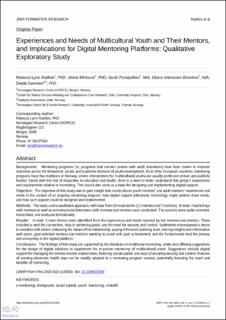| dc.contributor.author | Radlick, Rebecca Lynn | |
| dc.contributor.author | Mirkovic, Jelena | |
| dc.contributor.author | Przedpelska, Sarah Mathisen | |
| dc.contributor.author | Brendmo Halvorsen, Elanor | |
| dc.contributor.author | Gammon, Barbara Deede | |
| dc.date.accessioned | 2021-09-30T06:39:35Z | |
| dc.date.available | 2021-09-30T06:39:35Z | |
| dc.date.created | 2020-02-05T14:57:43Z | |
| dc.date.issued | 2020 | |
| dc.identifier.issn | 2561-326X | |
| dc.identifier.uri | https://hdl.handle.net/11250/2786425 | |
| dc.description.abstract | Background: Mentoring programs (programs that connect youth with adult volunteers) have been shown to improve outcomes across the behavioral, social, and academic domains. As in other European countries, mentoring programs have few traditions in Norway, where interventions for newly-arrived immigrant youth are usually profession driven and publicly funded. Faced with the risk of disparities in education and health, there is a need to better understand this group’s experiences and needs relative to mentoring. Such an understanding also may serve as a basis for designing and implementing digital support. Objective: The objective of this study was to gain insight into immigrant youth mentees’ and adult mentors’ experiences and needs in the context of an ongoing mentoring program, how digital support (e-mentoring) might address these needs, and how such support could be designed and implemented. Methods: The study used a qualitative approach (interviews and workshops), with data from 28 respondents. The sessions were audio recorded, transcribed, and analyzed thematically using NVivo. Results: In total, 3 main themes were identified from the experiences and needs reported by the mentees and mentors. These included a need for connection, help in achieving goals, and the need for security and control. Conclusions: The findings of this study are supported by the literature on traditional mentoring, while also offering suggestions for the design of digital solutions to supplement the in-person mentoring of immigrant youth. Suggestions include digital support for managing mentee-mentor relationships, fostering social capital, and ways of ensuring security and control. Features of existing electronic health apps can be readily adapted to a mentoring program context, potentially boosting the reach and benefits of mentoring. | |
| dc.language.iso | eng | en_US |
| dc.relation.uri | https://www.ncbi.nlm.nih.gov/pubmed/32014847 | |
| dc.rights | Navngivelse 4.0 Internasjonal | * |
| dc.rights.uri | http://creativecommons.org/licenses/by/4.0/deed.no | * |
| dc.subject | Immigrasjon | |
| dc.subject | Immigration | |
| dc.subject | Social Capital | |
| dc.subject | Social Capital | |
| dc.subject | Mentorering | |
| dc.subject | Mentoring | |
| dc.subject | Ungdom | |
| dc.subject | Youth | |
| dc.title | Experiences and Needs of Multicultural Youth and Their Mentors, and Implications for Digital Mentoring Platforms: Qualitative Exploratory Study | en_US |
| dc.type | Peer reviewed | en_US |
| dc.type | Journal article | en_US |
| dc.rights.holder | © Rebecca Lynn Radlick, Jelena Mirkovic, Sarah Przedpelska, Elanor Halvorsen Brendmo, Deede Gammon | |
| dc.description.version | publishedVersion | |
| cristin.ispublished | true | |
| cristin.fulltext | original | |
| cristin.qualitycode | 1 | |
| dc.identifier.doi | 10.2196/15500 | |
| dc.identifier.cristin | 1791259 | |
| dc.source.journal | JMIR Formative Research | en_US |
| dc.source.volume | 4 | en_US |
| dc.source.issue | 2 | en_US |
| dc.relation.project | Norges forskningsråd: 269438 | |
| dc.subject.nsi | VDP::Sosiologi: 220 | |
| dc.subject.nsi | VDP::Sociology: 220 | |

